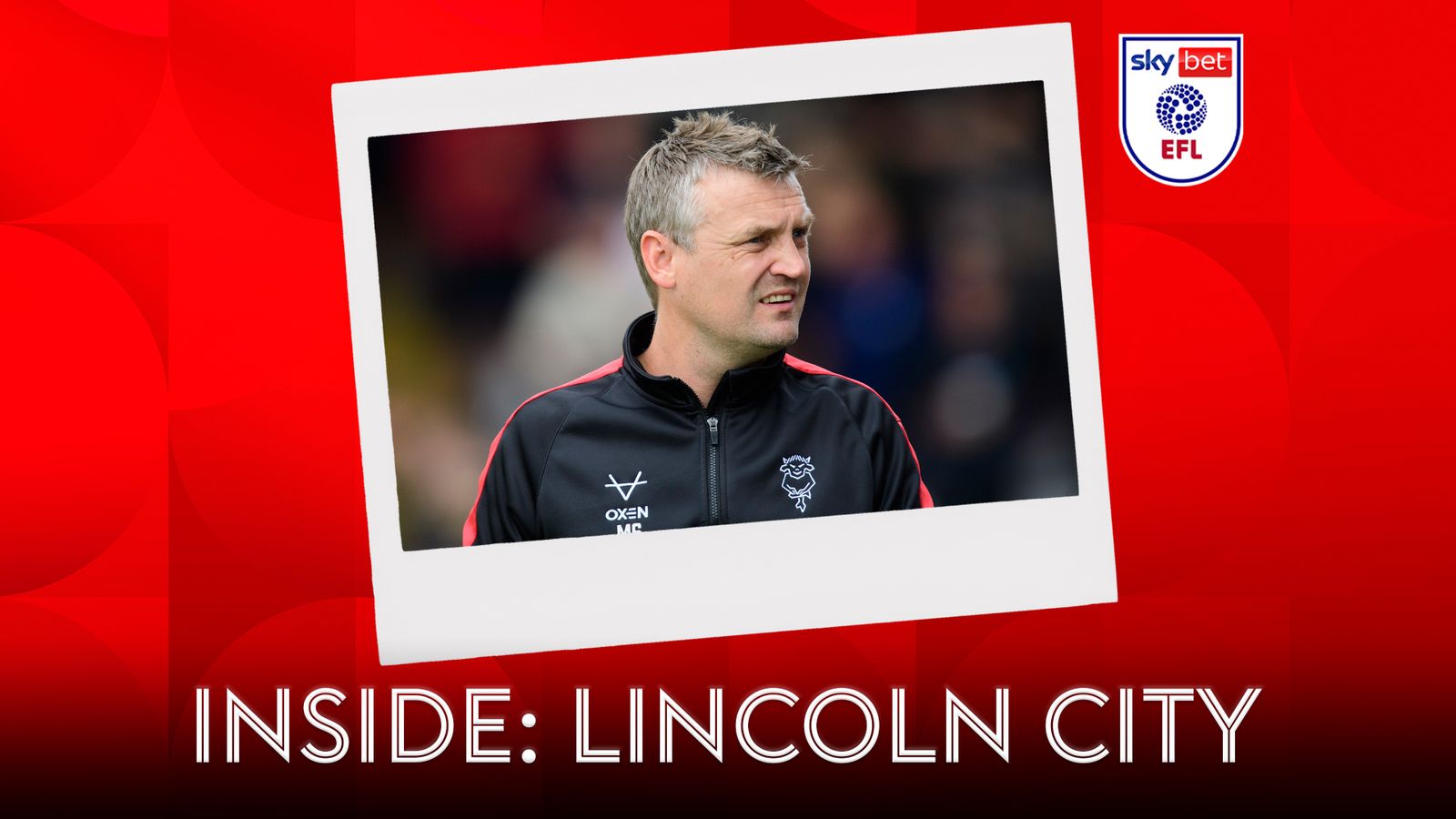
Lincoln City are not the richest club in League One but they might just be the most innovative. And perhaps that is what it will take for them to find what they call “the sweet spot” and realise their goal of reaching the Championship.
A 2-0 home win over Reading on the opening weekend was the perfect start for Michael Skubala’s side. The only surprise was that neither goal came from a set-piece. The Imps led League One on that particular metric last season – and that was no accident.
However, the first goal did come following a long ball up the field by goalkeeper George Wickens. Maybe that too was the product of insights gleaned from the data. In conversation with chief executive Liam Scully at the training ground, he is a little coy.
“Maybe the only thing I would share at this stage is that I believe build-up principles are often dictated by what is in vogue in football, but these things are cyclical. In 10 years’ time, playing 4-4-2 and going from back to front might be in fashion once again, who knows?
“What I will share is that we obsess about outcomes, not about what is trending.”
Going against the grain is Lincoln’s strength. Skubala outperformed the budget last season and the season before, statistically their most successful coach this century. “Look at the data and there is a huge gap between resources and output,” says Scully.
“I see our approach like a game of Top Trump cards. If you spread limited resources and try to beat the opposition at absolutely everything, you will end up being slightly less good than your opponents across the board. Our approach is to really major in a number of areas and commit, like really commit, in those areas.
“Our aim is to find the biggest points of difference. It is knowing where we can shift the dial, make the biggest impact, get the biggest bang for our buck.” Set-pieces, for example? We set out to be the best in the division at it. We managed to be the best in the country.”
Scully admits that plenty of other clubs have access to the artificial intelligence they used to master set-pieces. “You have to really commit to it.” That is where Skubala comes in. Because you have to more than commit to it. You have to actually coach it.
“I started to look at AI and set-pieces in my Leeds days,” Skubala tells Sky Sports. He was a coach there during their Premier League run, having joined the club after many years within the Football Association, including a stint as England’s futsal coach.
“The sexy thing is to major on building from the back. But you might only have six restarts per game from the goalkeeper. You have 50 throw-ins. Seven to 10 corners. So, where do you put your chips? A third of goals come from set-pieces at every level.
“We brought in an AI company to help us and that has got some really good returns. But you can buy all the data, it is about what you do with it. The ways that we score from set-pieces now, a lot of players would not buy into it. But we work hard on coaching it.
“We devise a plan against each opposition and then we go and work on it.” When Skubala says work on it, he means it. Not for Lincoln the single session on set-pieces before the game. “We do set-piece delivery three or four times a week to maximise it.”
Any insights he can share? “Everybody thinks that short corners are no good. But a short corner taken inside 20 seconds is the best corner that you can take. Short corners over 20 seconds are the worst corner that you can take. It is all about how you coach that.”
It is just one example of how Lincoln are trying to find an edge. They appreciate the correlation between wages and the league table is clear. But they hope that by focusing on maximising performance, they can “squeeze the pips” as Scully puts it.
Lincoln’s training ground is an impressive facility where players want for nothing. The gym equipment is Championship standard and players appreciate that. They know they will receive quality coaching, helping them to develop and helping them to stay healthy.
“We know we are not going to have the biggest squad so we need to put resources and expertise into keeping players fit and making sure we do not get many soft tissue injuries,” says Skubala. “If we lose five players in pre-season, that hurts the budget.”
This commitment to player care makes Lincoln a destination club for loans, building on the past success of international footballers Brennan Johnson and Morgan Rogers among others. Talent from top academies are pleasantly surprised by what they find.
Meanwhile, this emphasis on development is helping Lincoln to bring through players of their own. They have just sold 21-year-old forward Jovon Makama to Norwich City for a club-record fee after making almost 100 appearances for the club. This is the model.
“You do not buy a Ferrari and then spend no time tuning it,” says Scully. “We have talented people in the building. Our job is to help get the absolute maximum from them. We do not have infinite resources but we think about what gives us the best return.
“For example, maybe people raise eyebrows at a League One club having two assistant managers, but our coaching team are proven to be adding significant value every day with our players.
“So, maybe we do over-resource the coaching team, but going back to our principles, we believe that particular investment goes on to provide us with overall better returns.”
The communal area at the training ground is a hive of activity as players go through their data with analysts. Players get more attention here. They have the staff. “Better to spend it on that than a right-back who is not going to play, for example,” argues Skubala.
Some innovations are less obvious. Indeed, even Lincoln do not know exactly what they are looking for. It is why they have Jason Futers in a unique role as chief growth and innovation officer. “I am sure we are going down many rabbit holes,” concedes Scully.
“But Jason makes sure we have an eye on those innovations that can give us that quantum leap. We look at everything from the supplements that players are using to the dressing room lighting. The mindset is that we believe there is something out there.”
There is a realisation that it may take something special to achieve their ambitions. “We do not hide from the fact that we want to be a Championship football club. But it will take everybody at this football club to hit their sweet spot.” Investment too, perhaps?
“Maybe it will pique someone’s interest from an investment point of view,” adds Scully. After all, they appear ripe for it. The infrastructure is in place. “If we got investment, we are in a really good place to go like that,” agrees Skubala, gesturing to the skies.
For now, there is an acceptance that they need to take the long-term view. “It cannot be linear like Birmingham,” says the head coach. “We need to sell players to keep growing. Everyone wants to go faster but this is us. And I knew that was the job coming in.”
Skubala adds: “We all want to win promotion. I do not think you can take away that north star. The target is still there. A lot of things would have to go right for us, admittedly. But I do believe it is achievable.” Like Scully, he sees the potential is there.
“The assumption is that it is a small club. But this city comes alive with football on a Saturday and we have only been back in the Football League for eight years. We are growing, we are starting to push.” Keep innovating and Lincoln City may just surprise.
Want more in-depth EFL features?
This season, with over 1,000 of the EFL’s 1,891 games across the EFL, Carabao Cup and Vertu Trophy broadcast on Sky Sports and every one of the 72 EFL Clubs featured live on Sky more than 20 times, we are going the extra mile to tell you more about what is happening inside the EFL. Check out other features in the series here…
#Lincoln #City #Michael #Skubalas #innovative #Imps #setpiece #data #artificial #intelligence #gain #edge #Football #News









